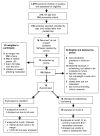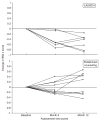A pilot randomized controlled trial of a clinic and home-based behavioral intervention to decrease obesity in preschoolers
- PMID: 20395948
- PMCID: PMC4374622
- DOI: 10.1038/oby.2010.87
A pilot randomized controlled trial of a clinic and home-based behavioral intervention to decrease obesity in preschoolers
Abstract
We evaluated the efficacy of a 6-month clinic and home-based behavioral intervention (Learning about Activity and Understanding Nutrition for Child Health; LAUNCH) to reduce obesity in preschool children ≥95th BMI percentile compared to enhanced standard of care (Pediatrician Counseling; PC). LAUNCH was a family-based behavioral intervention that taught parents to use child behavior management strategies to increase healthy eating and activity for their children and themselves. PC presented the same diet and activity recommendations, but was delivered in a one-time PC session. Eighteen children aged 2-5 years (mean 4.71 ± 1.01) with an average BMI percentile of 98 (±1.60) and an overweight parent were randomized to LAUNCH or PC. Assessments were conducted at baseline, 6 months (end of LAUNCH treatment) and 12 months (6 months following LAUNCH treatment). LAUNCH showed a significantly greater decrease on the primary outcomes of child at month 6 (post-treatment) BMI z (-0.59 ± 0.17), BMI percentile (-2.4 ± 1.0), and weight gain (-2.7 kg ± 1.2) than PC and this difference was maintained at follow-up (month 12). LAUNCH parents also had a significantly greater weight loss (-5.5 kg ± 0.9) at month 6 and 12 (-8.0 kg ± 3.5) than PC parents. Based on the data from this small sample, an intensive intervention that includes child behavior management strategies to improve healthy eating and activity appears more promising in reducing preschool obesity than a low intensity intervention that is typical of treatment that could be delivered in primary care.
Conflict of interest statement
The authors declared no conflict of interest.
Figures


References
-
- Ogden CL, Flegal KM, Carroll MD, Johnson CL. Prevalence and trends in overweight among US children and adolescents, 1999–2000. JAMA. 2002;288:1728–1732. - PubMed
-
- Ogden CL, Carroll MD, Curtin LR, et al. Prevalence of overweight and obesity in the United States, 1999–2004. JAMA. 2006;295:1549–1555. - PubMed
-
- Williams CL, Strobino B, Bollella M, Brotanek J. Body size and cardiovascular risk factors in a preschool population. Prev Cardiol. 2004;7:116–121. - PubMed
-
- Mannino DM, Mott J, Ferdinands JM, et al. Boys with high body masses have an increased risk of developing asthma: findings from the National Longitudinal Survey of Youth (NLSY) Int J Obes (Lond) 2006;30:6–13. - PubMed
-
- Datar A, Sturm R, Magnabosco JL. Childhood overweight and academic performance: national study of kindergartners and first-graders. Obes Res. 2004;12:58–68. - PubMed
Publication types
MeSH terms
Grants and funding
LinkOut - more resources
Full Text Sources
Medical

